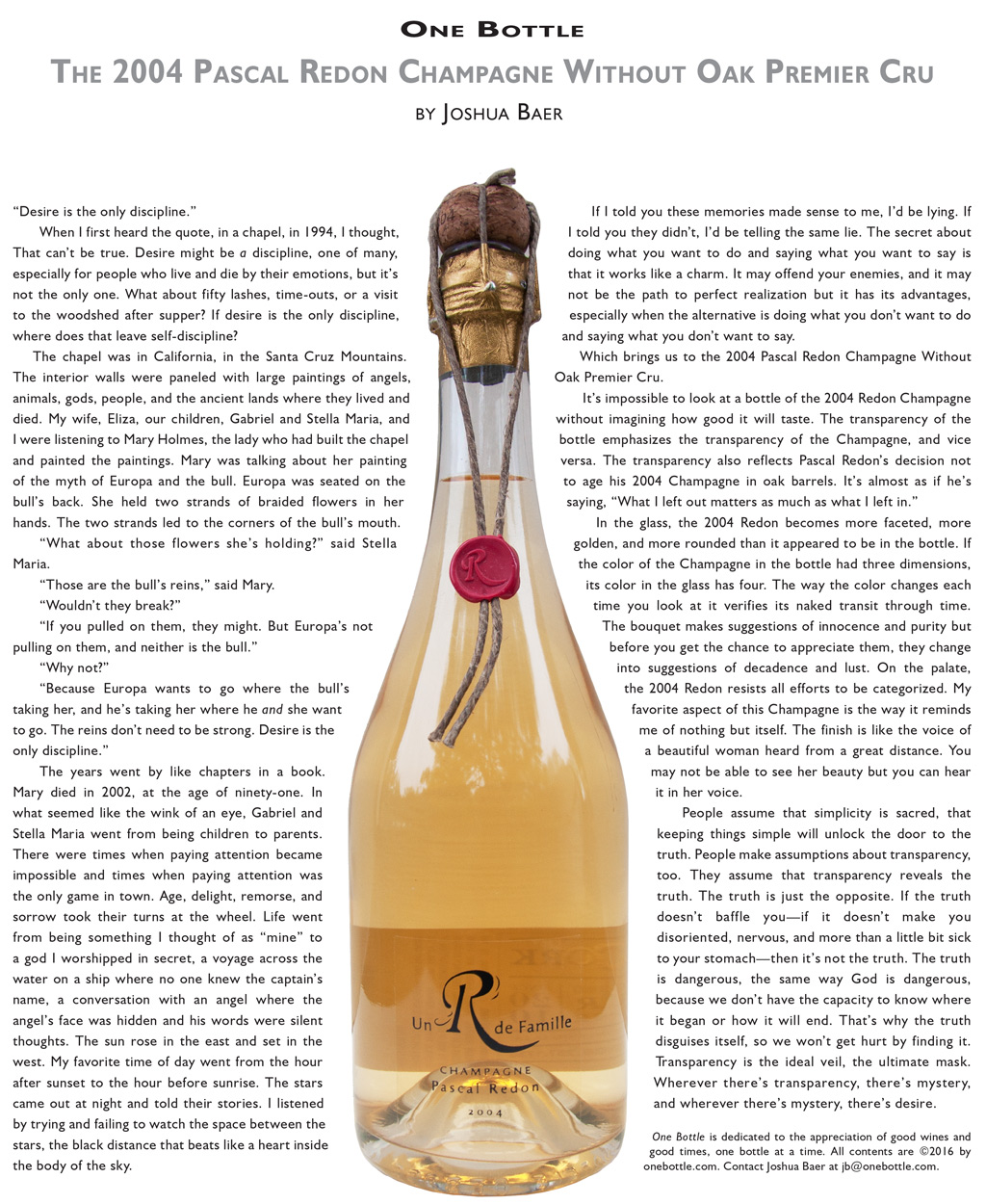2004 Pascal Redon Champagne Without Oak Premier Cru
“Desire is the only discipline.”
When I first heard the quote, in a chapel, in 1994, I thought, That can’t be true. Desire might be a discipline, one of many, especially for people who live and die by their emotions, but it’s not the only one. What about fifty lashes, time-outs, or a visit to the woodshed after supper? If desire is the only discipline, where does that leave self-discipline?
The chapel was in California, in the Santa Cruz Mountains. The interior walls were paneled with large paintings of angels, animals, gods, people, and the ancient lands where they lived and died. My wife, Eliza, our children, Gabriel and Stella Maria, and I were listening to Mary Holmes, the lady who had built the chapel and painted the paintings. Mary was talking about her painting of the myth of Europa and the bull. Europa was seated on the bull’s back. She held two strands of braided flowers in her hands. The two strands led to the corners of the bull’s mouth.
“What about those flowers she’s holding?” said Stella Maria.
“Those are the bull’s reins,” said Mary.
“Wouldn’t they break?”
“If you pulled on them, they might. But Europa’s not pulling on them, and neither is the bull.”
“Why not?”
“Because Europa wants to go where the bull’s taking her, and he’s taking her where he and she want to go. The reins don’t need to be strong. Desire is the only discipline.”
The years went by like chapters in a book. Mary died in 2002, at the age of ninety-one. In what seemed like the wink of an eye, Gabriel and Stella Maria went from being children to parents. There were times when paying attention became impossible and times when paying attention was the only game in town. Age, delight, remorse, and sorrow took their turns at the wheel. Life went from being something I thought of as “mine” to a god I worshipped in secret, a voyage across the water on a ship where no one knew the captain’s name, a conversation with an angel where the angel’s face was hidden and his words were silent thoughts. The sun rose in the east and set in the west. My favorite time of day went from the hour after sunset to the hour before sunrise. The stars came out at night and told their stories. I listened by trying and failing to watch the space between the stars, the black distance that beats like a heart inside the body of the sky.
If I told you these memories made sense to me, I’d be lying. If I told you they didn’t, I’d be telling the same lie. The secret about doing what you want to do and saying what you want to say is that it works like a charm. It may offend your enemies, and it may not be the path to perfect realization but it has its advantages, especially when the alternative is doing what you don’t want to do and saying what you don’t want to say.
Which brings us to the 2004 Pascal Redon Champagne Without Oak Premier Cru.
It’s impossible to look at a bottle of the 2004 Redon Champagne without imagining how good it will taste. The transparency of the bottle emphasizes the transparency of the Champagne, and vice versa. The transparency also reflects Pascal Redon’s decision not to age his 2004 Champagne in oak barrels. It’s almost as if he’s saying, “What I left out matters as much as what I left in.”
In the glass, the 2004 Redon becomes more faceted, more golden, and more rounded than it appeared to be in the bottle. If the color of the Champagne in the bottle had three dimensions, its color in the glass has four. The way the color changes each time you look at it verifies its naked transit through time. The bouquet makes suggestions of innocence and purity but before you get the chance to appreciate them, they change into suggestions of decadence and lust. On the palate, the 2004 Redon resists all efforts to be categorized. My favorite aspect of this Champagne is the way it reminds me of nothing but itself. The finish is like the voice of a beautiful woman heard from a great distance. You may not be able to see her beauty but you can hear it in her voice.
People assume that simplicity is sacred, that keeping things simple will unlock the door to the truth. People make assumptions about transparency, too. They assume that transparency reveals the truth. The truth is just the opposite. If the truth doesn’t baffle you—if it doesn’t make you disoriented, nervous, and more than a little bit sick to your stomach—then it’s not the truth. The truth is dangerous, the same way God is dangerous, because we don’t have the capacity to know where it began or how it will end. That’s why the truth disguises itself, so we won’t get hurt by finding it. Transparency is the ideal veil, the ultimate mask. Wherever there’s transparency, there’s mystery, and wherever there’s mystery, there’s desire.
One Bottle is dedicated to the appreciation of good wines and good times, one bottle at a time. You can write to Joshua Baer at jb@onebottle.com.
